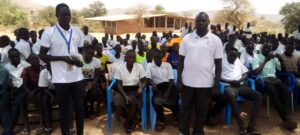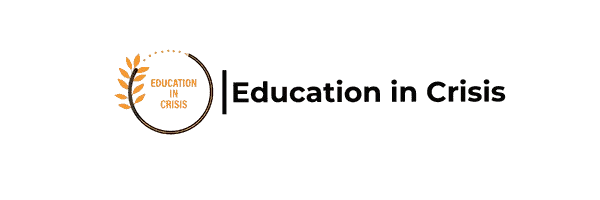Policy & Advocacy
Every child deserves a chance. Be the reason they thrive today.
❤ DONATE NOW AND SUPPORT OUR MISSION.

Education in Crisis
Policy & Advocacy for Education Rights
EiC positions itself as Africa’s leader in SDG4 access and as such, convening power to realize its mandate to facilitate data-driven policy development and provide technical assistance and capacity development to make accessible the right to education for all remains top priority. EiC works to influence policies ensuring access to education for marginalized children.
EiC Priorities for Advancing the 2030 Education Agenda in Africa
As part of its commitment to achieving the 2030 Education Agenda, Education in Crisis (EiC) is advancing three core priorities that respond to the urgent educational needs of children and youth across crisis-affected regions in Africa.
- Ensuring Relevant and Inclusive Teaching and Learning
- Integrating Education, Health, and Livelihood Pathways
- Promoting Values, Peace Education, and Responsible Citizenship
Ensuring Relevant and Inclusive Teaching and Learning
EiC is working to strengthen the relevance of education across all levels—from early childhood to youth and adult learning—by supporting curriculum reform, competency-based learning, and context-responsive pedagogy. Our teacher training initiatives integrate the latest insights from cognitive science and trauma-informed practices, ensuring that education is not only inclusive, but also responsive to the lived experiences of learners affected by conflict and displacement.
Integrating Education, Health, and Livelihood Pathways
Recognizing the interconnectedness of education, wellbeing, and economic empowerment, EiC supports programs that bridge education with health, nutrition, and future livelihoods. Our integrated approach includes school feeding (Relief Kitchen Initiative), life skills education, psychosocial support, and early exposure to vocational and digital skills that prepare students for life beyond the classroom.
Promoting Values, Peace Education, and Responsible Citizenship
EiC actively promotes peacebuilding, civic engagement, and values-based education through localized content and community-driven storytelling. We support initiatives that foster social cohesion, cultural understanding, and youth participation in rebuilding fractured communities. Inspired by African History, EiC seeks to embed African heritage, identity, and shared values into education materials, empowering learners to become agents of peace and transformation across the 56 African countries.
Together, these priorities ensure that EiC’s work contributes not only to learning recovery, but to the broader goals of social justice, resilience, and sustainable development across Africa.
National education policy-making in all former British colonies in Africa (i.e. Gambia, Ghana, Kenya, Malawi, Namibia, Nigeria, Sierra Leone, Tanzania, Uganda and Zambia) follows a British colonial model that favours the participation of and consultation with a tiny segment of the population who possess English language facility.
The Sub-Saharan Africa region faces a severe educational crisis: of the more than 244 million children not enrolled in school worldwide, 30% are in Sub-Saharan Africa, according to UNESCO data. This amounts to more than 72 million. Among those who do attend school, dropout rates are alarmingly high. According to the World Bank, 20% of students aged 12 to 14 drop out of school, a figure that rises to 40% in the 15 to 18 age group.
The quality of education is another major concern in this subcontinent. Many schools lack basic resources, such as textbooks and trained teachers. This lack of resources is reflected in low academic performance levels: only 10% of children who complete primary school in the region have minimal skills in reading and mathematics. Let’s zoom in on the data by country. According to recent measurements from UNESCO’s MILO project, which has measured learning outcomes in six African countries before, during, and after the pandemic, in 2021, the proportion of students who achieved minimum performance levels in reading was 0.1% in Burundi, 2.3% in Zambia, 9% in Burkina Faso, 10.8% in Ivory Coast, 13% in Senegal, and 46.7% in Kenya. In mathematics, the data improves slightly, ranging from 2.1% in Zambia to 74.1% in Kenya. In between, we have 8.9% in Ivory Coast, 13.5% in Burundi, 23.7% in Burkina Faso, and 34% in Senegal.
We cannot do it alone. Together, stronger we can.
Education and learning are not just about books and classrooms; it’s about offering hope, resilience, and the promise of a better future.
Despite the small support provided by EiC and other humanitarian actors, the education needs of children in emergencies far exceeds the assistance that is currently provided.
Greater funding is urgently needed to support the world’s most vulnerable children left behind with lifesaving education.
Let’s stand together to support these children and safeguard their right to education.
Their futures depend on it.
